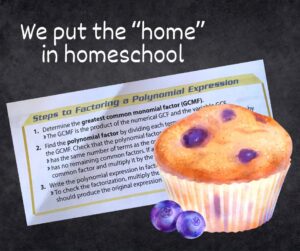When our kids were young, I briefly considered homeschooling. Then I was teaching our son to play piano, found myself with the John Thompson Book for Beginners rolled up in my hand, ready to swat him on the arm, and realized I was not homeschool material.
We paid a neighbor for piano lessons. She taught all the kids in the neighborhood and never once swatted one of them with a piano book.
Here I am these many years later and homeschooling. Sorta.
For several years we have been homeschooling three of our grands on Tuesdays when their mother works.
We refer to our school as Old School. At Old School, we often begin the day developing culinary skills—as in making a coffee cake. Welcome to home economics. “Careful with that crumb topping, girls! It’s all about even distribution!”
Coffee cake won’t be on a standardized test one day but give these girls a box of blueberries and pantry staples and they will deliver the goods.
Following Baking 101, our three students heave their 90-pound book bags (which should count for P.E. credits) onto the kitchen table and unload books, books and more books.
Our primary function is to check their work. Their primary function is to check us checking their work. Then we check why they checked our work, and they usually go mum, which indicates they have had instructions from home that Grandma and Grandpa sometimes veer off the path.
Someone checked me this week asking, “What is a homonym?”
“You. Ewe,” I said.
“Me?” she asked.
“No, I said you. And ewe.”
“Who?”
“YOU-WHO!” She laughed and we had our first knock-knock joke of the day.
Humor is one of the many electives we offer alongside cooking.
She giggled but resumed quizzing me, asking me to define synonym and antonym.
“Why are you quizzing me?” I asked.
“I just want to see what you know.”
It’s always good to vet the language arts teacher, even if she is a writer.
Math has taken a sharp turn as two of them are into algebra. They are solving for every letter of the alphabet to the power of 6 or 7 or 12 with random parentheses and fractions thrown in to increase the fun in “showing your work.”
One of our students writes somewhat large; showing her work for one problem can fill an entire page.
The Old School superintendent (the husband) loves math and numbers. His handwriting is small, but he could fill 20 pages showing his work for the many ways to solve 5 plus 5. He helps the girls solve problems and then offers multiple variations of the problem until the girls crawl under the table to see if he notices they are gone.
I prefer doing problems in my head. That way nobody can check my work. I tend to be brief and succinct.
At Old School, we insist students demonstrate they have mastered a concept by teaching that concept to one of us.
One of the girls recently learned a new math concept, after which her detail-loving Grandpa said, “OK, now teach it to me.”
To which she said, “Can I teach it to Grandma?”

